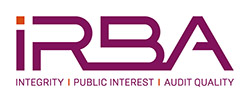IRBA successfully defends challenge to MAFR by East Rand Member District of Chartered Accountants
|
Johannesburg, Monday, December 6, 2021 – The Independent Regulatory Board for Auditors (IRBA) has received a favourable judgement with costs in the matter of East Rand Member District of Chartered Accountants (ERD) vs the IRBA. The ERD in its application sought to have the board decision on mandatory audit firm rotation (MAFR) reviewed and set aside. This is a pivotal moment for the IRBA in its quest to strengthen auditor independence. The judgement of the High Court Gauteng Division was handed down by Judge Norman Davis on December 2, 2021. In concluding on the matter, Judge Davis found that the ERD had not satisfactorily shown why the application was not launched within a reasonable period and without undue delay. The Judge remained unconvinced that there was a justifiable reason for the ERD's conduct regarding the delay. He found that the uncertainty caused by the ERD’s belated attack on the validity of the MAFR and its transformatory impact was prejudicial to the IRBA. He indicated that ERD’s attitude that the matter was not time sensitive - due to the fact that the actual enforcement of MAFR was earmarked for 2023 - lost sight of the principles regarding undue delay and displayed a callous disregard for the rights of the remainder of the industry and its clients, who in many instances, would have to go through a tender or selection process prior to 2023 in order to ensure the adequate audit rotation, including issues of transformation. The judge dismissed the application and awarded costs in favour of the IRBA. Says Imre Nagy, Acting CEO of the IRBA: “As early as 2013, discussions had already started globally about the need for regulatory measures to strengthen the regulatory environment and this included reports from the World Bank (ROSC Report 2013) regarding the types of measures that could be introduced including joint audits, mandatory tendering and mandatory audit firm rotation (MAFR). “In 2016, the IRBA embarked on a consultation process around strengthening auditor independence looking at joint audits, mandatory audit tendering and MAFR. Initial research that had been conducted in 2015 around these options was published in October 2016 and a comment process was opened to determine whether there was a preferred single or combination of regulatory steps the IRBA could take to limit the tenure of audit firms at their clients and ensure that a fresh pair of eyes would audit the financial statements after a tenure limit to be determined.” After the board reviewed the outcomes of the comment process and took its final decision to implement MAFR, the rule was gazetted on June 5, 2017, limiting audit firm tenure to 10 years at which time the auditor would no longer be considered eligible to accept re-appointment. Within that month, the Gupta Leaks were released implicating KPMG, and, in December of 2017, the collapse of Steinhoff occurred, being possibly the largest accounting scandal in South African history, implicating Deloitte. Judge Davis noted that the functions of the IRBA are set out in Section 4 of the Auditing Profession Act of 2005 (APA) and includes an obligation in section 4(1)(b) to take steps to promote the integrity of the auditing profession by, not only monitoring and prosecuting improper conduct, but by taking “steps it considers necessary to protect the public in their dealings with registered auditors” and in section 4(1)(c) it provides IRBA the powers to prescribe “standards of professional competence, ethics and the conduct of registered auditors” and in terms of section 4(2)(d) the IRBA is authorised to “take any measures it considers necessary for the proper performance and exercise of its functions of duties to achieve the objects of the APA”. Says Nagy: “The IRBA is pleased that its defence in this matter was strong and that the court found that it could therefore not condone the applicants undue delay in bringing the matter to court. At the time that our defence was prepared 38 percent of JSE-listed entities had already rotated audit firms. This has since risen to 48 percent of entities having rotated - or issued notice of intent to rotate - at least once as at end August 2021. “Of all rotations, 46 percent of these cite MAFR compliance since June 2017 as the main reason for rotating auditors. MAFR and compliance to the rule remains the leading reason for changing external audit firms, with the next most cited reason being a tender process at 12 percent.” Given the uncertainty of COVID-19 and its effect on the market since the beginning of 2020, this could have impacted some entities’ decisions regarding rotation of auditors, but it appears as if it has had little impact, as January to June 2020 is comparable to the preceding six months at 16 rotations for each half year which doubled in the period from July to December 2020 during the extended lockdown to 31 rotations. This trend has continued with 26 rotations occurring in the first half to June 2021. Concludes Nagy: “It is clear from our analysis that the horse has bolted on MAFR. The IRBA expects the pace of rotations to continue to pick up significantly in 2022 to meet the April 1, 2023 deadline. With this judgement behind us, the IRBA will now focus more of its attention on monitoring implementation of the rule. We strongly encourage listed entities and Public Interest Entities (PIEs), especially those that may have awaited the judgement, to move ahead with their planning for audit firm rotation and not leave it until the last minute, or they might face the risk of being unable to appoint a preferred audit firm due to unavailability or potential ineligibility because of potential conflicts of interest.” Ends Notes to Editors: More about the IRBA: The IRBA is a public protection statutory body established to protect the financial interests of the public by ensuring registered auditors and their firms deliver services of the highest quality. It upholds audit firm independence to ensure that audit quality is such that it enhances the accuracy and credibility of financial performance reporting. In this way, the IRBA has an important role to play in building the reputation of South Africa as an investment market for both local and global investors and driving economic growth for the country. The IRBA also registers suitably qualified accountants as auditors, who must adhere to the highest ethics standards, and promotes the auditing profession through the effective regulation of assurance conducted in accordance with internationally recognised standards and processes.
|





